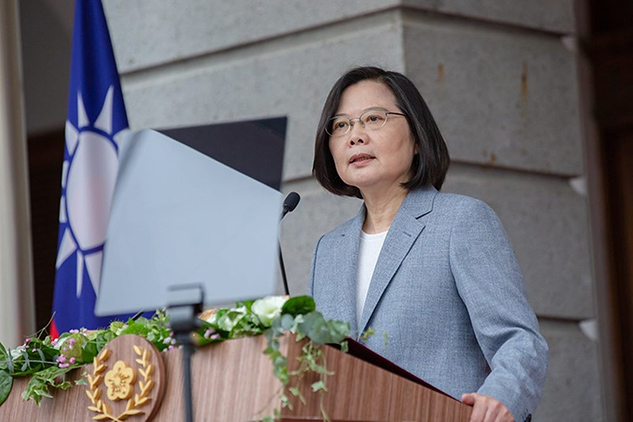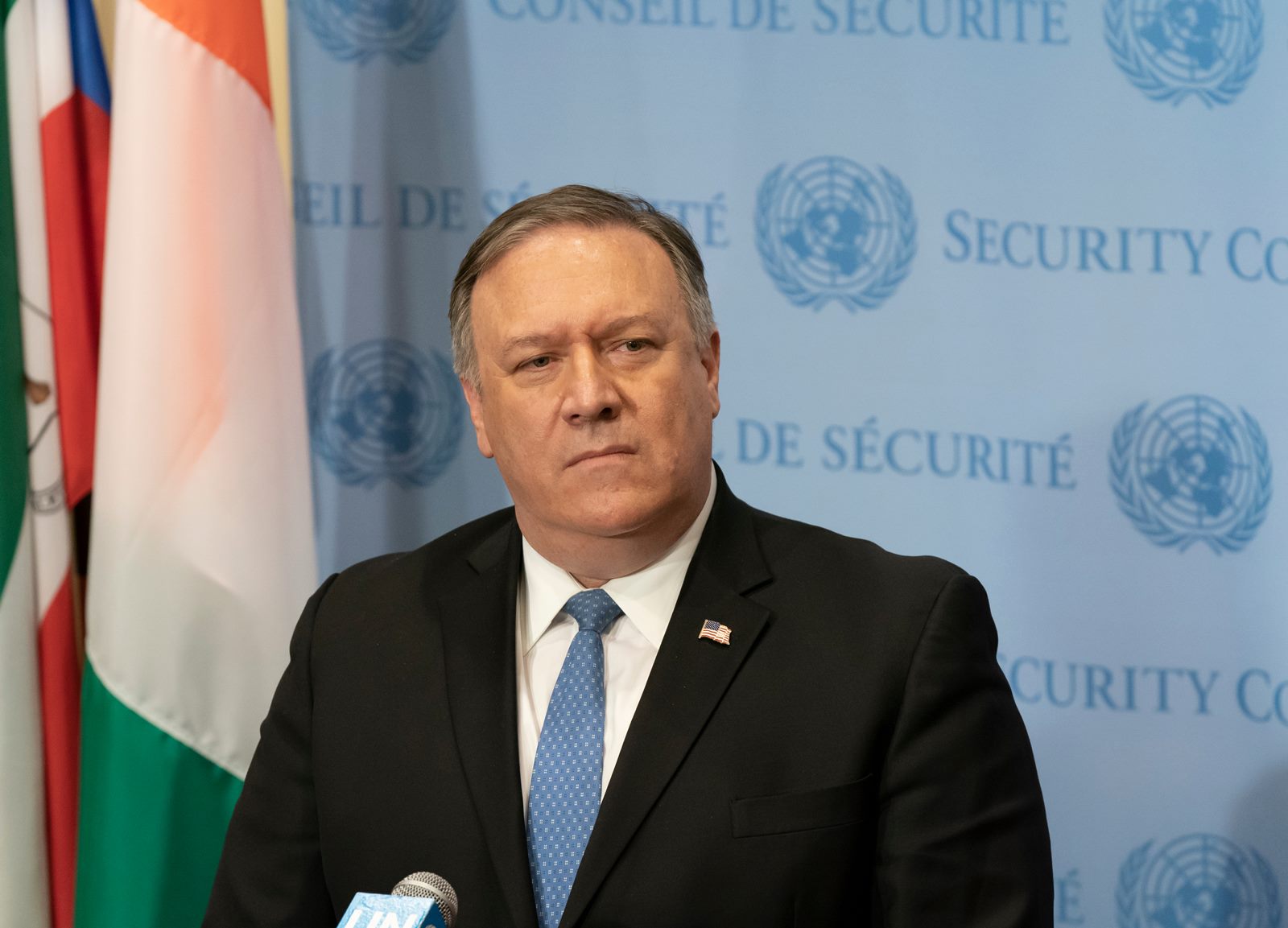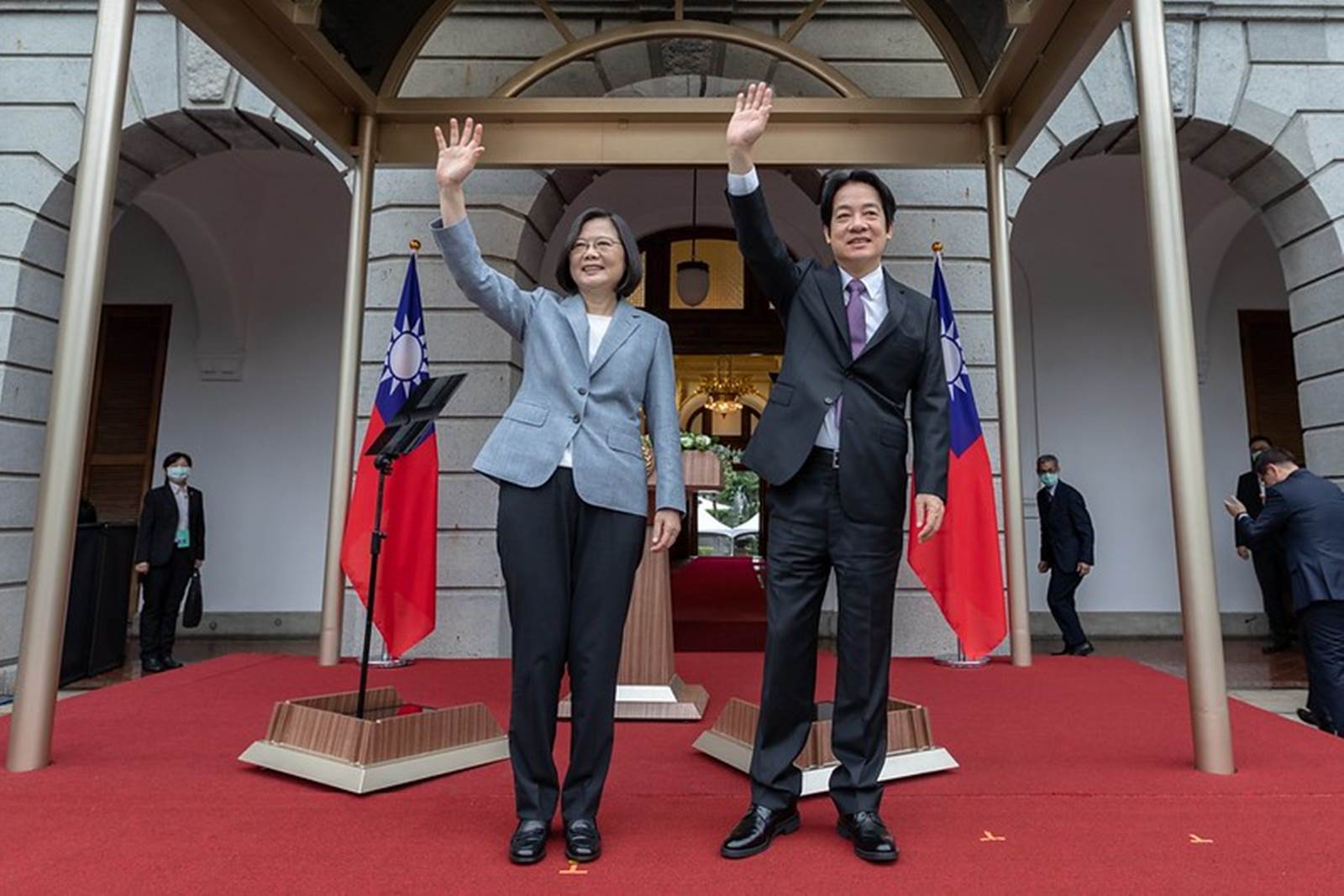What Tsai Ing-wen’s Inaugural Address Told Us about Future Ties with the U.S., China

Source:Office of the President, ROC (Taiwan)
Before Tsai Ing-wen gave her inaugural address on May 20, the United States issued three messages showing that ties with Taiwan are closer than ever. But Tsai faces a huge challenge on China. What did her speech reveal?
Views
What Tsai Ing-wen’s Inaugural Address Told Us about Future Ties with the U.S., China
By Linden Chenweb only
Calm and restrained, President Tsai Ing-wen walked slowly to the rostrum in front of Taipei Guest House to deliver her inaugural address for her second term.
She started by focusing on the many measures Taiwan took to combat the spread of COVID-19 and then set forth her vision for the country’s industrial development, social stability, national security and deepening of democracy over the next four years.
“No matter the difficulties we face, we can always count on our democracy, our solidarity, and our sense of responsibility towards each other to help us overcome challenges, weather difficult times, and stand steadfast in the world,” Tsai said.
She pledged to develop six core strategic industries – the digital sector, cybersecurity, biotech and medical technology, national defense, green energy, and stockpile sectors – over the next four years while strengthening the social security net and international participation.
It was also one of the strangest presidential inauguration ceremonies in the history of the Republic of China, as Taiwan is formally known. A day before the festivities, three statements issued by the United States illustrated the rapidly changing international situation.
The first was a letter written by U.S. President Donald Trump. In it, he said an investigation by his administration revealed more than a dozen serious failings in the World Health Organization’s response to the new coronavirus in the previous six months and gave the health agency an ultimatum. If the WHO did not “commit to major substantive improvements within the next 30 days,” he would make his temporary freeze of U.S. funding to the WHO permanent and reconsider U.S. membership in the organization, he wrote.
The second was a statement made by the U.S. Department of Health and Human Services. It came after Taiwan’s attempt to participate in the World Health Assembly (WHA), the decision-making body of the WHO, had once again failed. The agency stressed that the WHO’s exclusion of Taiwan was “a serious public health and safety concern not only to the island’s 23 million people but to the world. The WHO must put public health above politics.”
The third was a statement made by U.S. Secretary of State Mike Pompeo on the inauguration. It was the first time since official ties between the U.S. and Taiwan were severed in 1979 that an American secretary of state sent an open message congratulating Taiwan’s president. The statement read: “The United States has long considered Taiwan a force for good in the world and a reliable partner……I am confident that, with President Tsai at the helm, our partnership with Taiwan will continue to flourish.”
 U.S. Secretary of State Mike Pompeo (Shutterstock)
U.S. Secretary of State Mike Pompeo (Shutterstock)
The three statements indicated that relations between the U.S. and Taiwan are closer than ever before.
“China has closed almost every door to Taiwan, while the United States has opened almost every door to Taiwan,” said Taiwan Thinktank advisory committee member Tung Li-wen.
Closer Relations Inevitable under Paradigm Shift
The warming of ties between the U.S. and Taiwan was all but inevitable under the paradigm shift taking place in the global world order.
Lo Chih-cheng, a lawmaker with the ruling Democratic Progressive Party, said Washington had followed a policy of engagement with China in the past, hoping that its democratic power would lead to change in Beijing’s authoritarian ways. But the policy of engagement has now given way to “China skepticism,” he said.
“Even Kissinger [who pushed for diplomatic relations with China] and his disciples have changed their positions. Anybody in the U.S. advocating engagement with China right now would be outside the mainstream and even ridiculed,” Lo said.
Within the triangular relations between the U.S., Taiwan, and China, Taiwan has clearly tilted heavily toward Washington, and Washington has backed Taiwan. Chang Wu-ueh, an associate professor in Tamkang University’s Graduate Institute of China Studies, said Beijing’s large-scale military exercises targeting Taiwan were driven by strengthening U.S.-Taiwan relations.
“But if Taiwan leans 70 percent or 100 percent toward the U.S., Communist China’s response will be very different,” Chang argued.
China was surely watching to see if Tsai offered an olive branch in her inaugural address. Bao Chengke, the director of the School of Advanced International and Area Studies at East China Normal University in Shanghai, said the authorities in Beijing were still hoping Tsai might indicate that “the two sides of the Taiwan Strait belong to one China.”
“The 1992 consensus may be out-of-date, but the one-China principle is not,” he said.
Tougher, More Confident than Four Years Ago
In fact, Tsai did not make any mention of the “1992 consensus” [the formula used by Tsai’s predecessor Ma Ying-jeou to pave the way for better relations with Beijing that implies Taiwan is a part of China] or the “1992 spirit of mutual understanding” in her inauguration speech. She simply reiterated her principles of “peace, parity, democracy and dialogue” as the basis for cross-Taiwan Strait contacts and stressed she will continue to handle cross-strait affairs according to “the Constitution of the Republic of China” and the Act Governing Relations between the People of the Taiwan Area and the Mainland Area.
“This has been our consistent position for maintaining the peaceful and stable status quo in the Taiwan Strait,” she said.
Her tone was far tougher than in her inauguration speech at the start of her first term in May 2016.
“We will not accept the Beijing authorities' use of ‘one country, two systems’ to downgrade Taiwan and undermine the cross-strait status quo. We stand fast by this principle,” she said.
In contrast with four years earlier when she talked about the “spirit of mutual understanding” in 1992, Tsai is more confident today, clearly intimating that the Republic of China is in fact an independent, sovereign country even while, in principle, avoiding provocative language to say it.
Her assertiveness, however, drew criticism from China’s Taiwan Affairs Office, which charged Taipei with “unilaterally damaging the political foundations of cross-strait ties” and said China would “never leave any room for Taiwan independence separatist activities.” The tone was similar to its attitude over the past four years.
Davidson College professor Shelley Rigger, an expert on East Asian politics and Taiwan, said she felt “President Tsai has done an incredible job” in balancing Taiwan’s interests between the U.S. and China.
Tsai has not conceded to the demands that China has made but also has not done anything that would give China an excuse or a reason to make relations worse, Rigger said.
“From the very beginning of her presidency, her inaugural address, and right through everything that she has said and done in the last four years up to the present, she has been really consistent, and it’s not easy,” Rigger said.
 Source: Office of the President, ROC (Taiwan)
Source: Office of the President, ROC (Taiwan)
Facing a Conflicted China
China’s nationalistic response also reflects a changing world. AIA Capital chief economist Henry Wu said the China’s use of economic incentives to legitimize its rule has run its course, and nationalism is now its only tool left to maintain stability.
Tamkang University’s Chang believes that nationalistic bent has been evident in Chinese President Xi Jinping’s “one China, anti-independence” bottom line. The strategy relies on China leveraging its existing strengths to attract more Taiwanese businesses and youth to promote integrated development across the Taiwan Strait while also putting pressure on Taiwan in the military and diplomatic spheres and on the issue of sovereignty.
But the strategy to pressure Taiwan has gradually shifted and become less pronounced. Rigger pointed to a commentary by retired Air Force officer Qiao Liang on May 4 as an illustration of the shifting tide. Qiao is known as a hawk on Taiwan and has advocated using force to bring Taiwan into the fold, but Rigger noted that in his essay he backed off the idea of solving the Taiwan problem by force.
That’s because the move does nothing to help the Chinese people and could make life for people in China a lot more painful and difficult and because China’s top priority according to Qiao is the rejuvenation of the Chinese nation, which means assuring the well-being of the Chinese people, Rigger said.
“Solving the Taiwan problem by force is not what national rejuvenation needs,” she said, in describing Qiao’s argument.
The article signals that the ongoing internal debate in China between the hawks and doves seems no closer to being settled, leaving Tsai Ing-wen to face a somewhat conflicted China.
Unlikely to See a Breakthrough
Over the past four years, however, Taiwan and China have failed to develop any channel of mutual trust, and it is highly unlikely that Tsai will achieve any form of historic breakthrough in cross-strait relations.
“Without any communications channel in which there exists mutual trust, how can you express goodwill?” said Chang. In the past, whenever one of the two sides has tried to extend an olive branch, and there has not been an appropriate communications channel, the goodwill has not only been ignored, it has also sparked pressure internally, rendering the goodwill unsustainable, he argued.
To Tsai Ing-wen, the pragmatic approach at this point in time in this peaceful environment of crisis management is to focus on promoting domestic initiatives and strengthening international participation.
Those initiatives could include amending the Constitution without touching on such hot button issues as independence vs. unification, the country’s name or the national anthem, instead focusing on lowering the voting age to 18, which seems to have support across party lines. It could also mean working on other less contentious issues, such as setting up a human rights commission under the Control Yuan or turning the Examination Yuan into a national human resources agency.
“My dear citizens, the path ahead of us is long, and we are about to begin a new chapter in Taiwan’s story. Taiwan’s story belongs to each and every one of us, and it needs each and every one of us,” Tsai said in her inauguration speech.
Over the past four years, she has built a foundation on progressive values and the successful response to the COVID-19 outbreak that has made many Taiwanese proud of their country. The question now is whether Tsai can write her own chapter on the Republic of China’s economic and constitutional history. Taiwan’s citizens will all be watching very closely.
Have you read?
♦ Are Chinese and US Maneuvers in the Asia-Pacific a Precursor to War?
♦ A Deep Dive into Taiwan’s 2020 Election: Big Victory for Tsai, but What Comes Next?
♦ Nojima Tsuyoshi: Taiwanese Youth Vote for Change
♦ ‘Today’s Hong Kong, Tomorrow’s Taiwan? Today’s Korea, Tomorrow’s Japan?’
Translated by Luke Sabatier
Edited by Kwangyin Liu
Uploaded by Judy Lu






